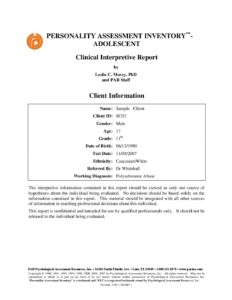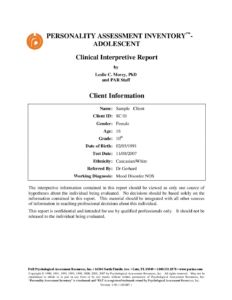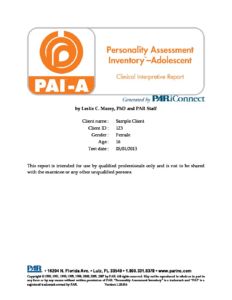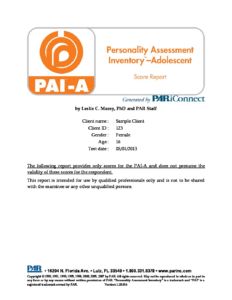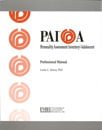
Personality Assessment Inventory-Adolescent pai-a
Author: Leslie C. Morey, PhD
For: Assess adolescent personality
Reading Level: Adolescent
Format: Paper-and-Pencil, Download or Online (via PARiConnect)
Length: 30-45 minutes
Scoring: Hand Scored; Computer Scored; or Online
Please see our FAQ before purchasing e-Manual
Online Forms, Reports, Kits & e-Manuals
Click to browse products
Printed Manuals
Click to browse products
Printed Forms & Handscoring Materials
Test forms, response booklets and scoring reference manuals.
Printed Kits
Click to browse products
PAI-A e-Manual
PAI-A online Interpretive Report (each) min order 5
PAI-A online Score Report (each) min order 5
PAI-A online i-Admin (each) min order 5
PAI-A Professional Manual
PAI-A Critical Items Forms – Adolescent (25)
PAI-A Hand Scoreable Answer Sheets (25)
PAI-A Hardcover Reusable Item Booklet
PAI-A Profile Forms – Adolescent (25)
PAI-A Introductory Kit
Contact PAA today to set up your PARiConnect online account to utilise online administration, scoring and reporting.
Related Products
PAI
PAI-A SP(Software Portfolio) is used to score and interpret PAI-A results, the PAI-A SP provides comprehensive and accurate Clinical Interpretive Reports based on on-screen administration of the PAI-A or hand-entry of an adolescent’s item or scale raw scores.
Description
The PAI-A was designed to complement its parent instrument, the Personality Assessment Inventory (PAI). Its development grew out of the expressed interest of many professionals who wished to use the PAI with the adolescent population in clinical settings. As a result, the PAI-A closely parallels the adult version of the instrument -it retains both the structure and most of the items from the PAI. In addition, the PAI-A demonstrates clinical utility with adolescents ages 12 to 18 years in a variety of settings. The PAI-A provides psychologists working with children and/or adolescents in clinical practice, in schools or in forensic settings with vital information to assist in decision making.
The clinical constructs assessed by the PAI-A were selected on the basis of their importance within the nosology of mental disorder and their significance in contemporary diagnostic practice. These constructs assess experiences (e.g., suicidal ideation, depression, anxiety) that are expressed with reasonable consistency across the life span versus constructs that are specifically pertinent to diagnostic concepts applicable to adolescents. In some instances, items were altered to be particularly applicable to the experiences of adolescents, but of greater significance in item selection was an item’s ability to provide a direct assessment of different components of the relevant psychopathological construct.
The self-administered PAI-A is composed of 264 items that comprise 22 non-overlapping scales–four Validity scales, 11 Clinical scales, five Treatment Consideration scales, and two Interpersonal scales. Ten of these scales contain conceptually driven sub-scales designed to facilitate interpretation and coverage of the full breadth of complex clinical constructs.
Features
Fewer items than in the PAI adult version, making the instrument easier to complete for adolescents.
Items are written at a fourth-grade reading level.
Takes only 30-45 minutes to complete and 10-15 minutes to score.
22 non-overlapping scales assure high discriminant validity.
PAI-A scores are presented in the form of linear T scores. T-score transformations are calibrated with reference to a U.S. Census-matched community sample of 707 adolescents.
Extensive normative data also were gathered for a representative sample of youth being seen in clinical settings.
Standardisation
The standardisation of the PAI-A utilised information obtained from two participant groups. The first sample was composed of 707 students from the community in junior and senior high school and college who were between the ages of 12 and 18 years from 21 States. This sample is comparable to the U.S. population (U.S. Bureau of the Census, 2003) for age, gender and race/ethnicity. The second sample -the clinical sample -was composed of 1,160 adolescents from a total of 78 clinical sites. More than half of this group was tested in an outpatient mental health setting, with the next largest group evaluated in juvenile or correctional settings.
Reliability
Internal consistency for the substantive scales (i.e., all scales except ICN and INF) of .79 and .80 for the community standardisation sample and the clinical sample, respectively.
Average test-retest stability coefficient of .78 for the substantive scales (M = 18 days; SD = 5.77).
Validity
Several widely used instruments in the field of personality and psychopathology were applied in the examination of external correlates of various PAI-A scales. These included broad-based assessment instruments that served as referents for a wide variety of PAI-A scales as well as more focused measures that targeted specific PAI-A constructs. These measures included:
Minnesota Multiphasic Personality Inventory-Adolescent™ (MMPI-A™)
Adolescent Psychopathology Scales™ (APS™)
Personality Inventory for Youth (PIY)
NEO Five-Factor Inventory (NEO-FFI™)
Symptom Assessment-45 (SA-45)
College Adjustment Scales (CAS)
Clinical Assessment of Depression™ (CAD™)
Adolescent Anger Rating Scale™ (AARS™)
Beck Depression Inventory® (BDI®)
State-Trait Anxiety Inventory (STAI)
Scoring Materials
PAI-A Professional Manual contains information related to scoring and administration procedures, the development of the PAI-A, reliability and validity.
PAI-A Item Booklet is reusable and contains the 264 PAI-A items with instructions on completing the instrument.
PAI-A HS (Hand Score)-Adolescent Answer Sheet is a carbonless form that is used by the respondent for marking answers and then is used by the clinician for scoring purposes.
PAI-A Profile Form-Adolescent is used by the clinician to aid with the interpretation of test results. This form contains a clinical “skyline” indicating the distribution of scores from a large sample of clinical cases, enabling comparison of an adolescent’s scores with those in the clinical sample.
PAI-A Critical Items Form-Adolescent lists 17 items across seven content areas that may suggest and quickly alert the clinician to the existence of behaviour or psychopathology that requires immediate attention.
Administration Folio is used in situations when a desktop or tabletop is not available. The folio holds both the Item Booklet and either one of the answer sheets, and it provides a hard surface so that respondents may easily complete the PAI-A.
NB: Prices are in Australian dollars inclusive of GST. NZ customers need to log in to view ex-GST prices.




